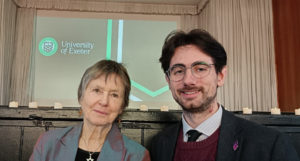Exeter researchers comment on COP29

University of Exeter researchers have responded to the outcomes of the COP29 climate change conference.
Held in Baku, Azerbaijan, organisers said the conference was run “in solidarity for a green world”.
The outcomes included a new finance deal to help poorer countries – but the African Group of Negotiators described the final pledge as “too little, too late”.
Here is a selection of comments from University of Exeter researchers:
Professor Peter Cox said: “It is absolutely fair that developing countries should receive money from the developed world to help them adapt to climate change. It seems that some progress has been made on that, but the sum agreed ($300bn/yr) still falls well short of the climate change damages that developing countries suffer. COP29 was dominated by vital discussions about climate change damages and compensation, rather than climate change mitigation. Regrettably, this is because the UNFCCC (which runs the COP process) is failing to reduce the world’s dependency on fossil fuels anywhere near fast enough.”
Professor Stephen Sitch said: “Given the geopolitical realities, the $300bn represents a foundation that can be built upon. Also, there is an important agreement on carbon markets which will open up further opportunities for expansion of nature-based solutions.”
Dr Martina Egedusevic, a Green Futures Solutions Impact Fellow, said: “COP29 underscored the critical role of nature-based solutions in addressing climate change, and the need to integrate them into national strategies where they can enhance resilience and mitigate environmental impacts. But there is an important task: the current allocation of climate funding to nature-based solutions is insufficient, receiving less than 10% of the necessary investment to meet global climate and biodiversity goals by 2030. We now need to mobilise both public and private finance through partnerships, ensuring that these solutions are adequately funded and effectively implemented.”
Ashish Ghadiali said: “However imperfect it may be, the UNFCCC has achieved huge amounts in its 30-odd-year fight for climate justice… Diplomacy in this space has led to the recognition of 1.5°C as a critical threshold. It has led to recognition, even as we wait for the world’s richest countries to put some money in the bucket created, of the need for global finance for loss and damage. Progress has not been enough and too slow. But how does a new world come into existence?” This quote comes from a longer article in the Observer.
Dr Raphaelle Haywood said: “Regardless of how disappointing this COP was – once again – the fossil fuel era is doomed. The economic transition to renewable energy is already well under way. But international climate cooperation still has a crucial role to play – and next year, COP needs to come up with a plan to phase out fossil fuels.”
Dr Constantine Manolchev said: “Research increasingly shows that sustainable transition is predicated on the success of regional practices and interventions. This understanding must not be used to burden developing countries with the sole responsibility to act. In this context, the climate deal reached at COP29 has been criticised as being ‘too little, too late’. However, considering the complex geopolitical context against which it was brokered, it seems to have snatched, if not victory, then at least compromise from the jaws of defeat.”
Professor Richard Betts MBE said: “It’s disappointing to see that this year’s COP text still suggests global warming is about 1.1°C, when the World Meteorological Organisation has shown that it’s actually 1.3°C – much closer to 1.5°C, which the world agreed in Paris to pursue efforts to stay below. I can’t help wondering if being out of date on the science is contributing to a lack of urgency.”
Professor Ben Groom said: “It seems quite clear that fossil-fuel-rich countries have been central to the inertia on climate change mitigation and climate finance in this and previous COPs. The absence of any clear text on mitigation commitments, and the dilution of commitments on finance are regrettable. It was at the Copenhagen COP15 in 2009 that $100bn per year was first pledged for assisting the transition in developing countries. We are still waiting for this commitment to be fully achieved. This inertia is not helped by the lack of ambition of the recent COP Chairs.”
Dr James Dyke said: “One of the outcomes of COP29 is agreement on Article 6 of the 2015 Paris Agreement. This is about how rich nations are going to pay poorer nations to offset their carbon emissions. Unfortunately, this will likely do very little to decrease climate impacts because there are problems with carbon offsetting. So significant are these that we have recommended that the University of Exeter, along with all other universities, should remove all carbon offsets from their net zero targets.” Dr Dyke has co-written a longer article on this in the Conversation.
Professor Ian Bateman said: “The headlines on climate finance have overshadowed a startling lack of progress on climate action. Measures to triple renewables and double energy efficiency improvements until 2030, which were agreed at COP28, were removed from the COP29 agreement. This is not merely kicking the can down the road – because the road is melting as we sit and watch. No amount of climate finance will compensate for climate inaction – the bill will get higher as the impact accelerates away from our ability to ride the tiger we have unleashed.”
Professor Pierre Friedlingstein said: “It is very concerning to see that significant progress achieved last year at COP28, such as explicitly mentioning the fossil fuel transition, has been challenged again this year by a small group of countries. With a remaining carbon budget for 1.5°C of about five years, the world cannot afford such obstructive behaviour anymore.”
Stuart Brocklehurst, Deputy Vice-Chancellor, Business Engagement and Innovation, concluded: “The COP process is frustrating and inadequate, yet still essential. It forces governments to meet and debate action on climate change, nudging them towards progress. That progress is maddeningly – dangerously – slow, but losing this platform for action would be much worse. COP29 started with low expectations, it did deliver some achievements – but, against the challenging backdrop of some countries’ potential withdrawal from the Paris Agreement, we need COP30 next year to up the pace.”



